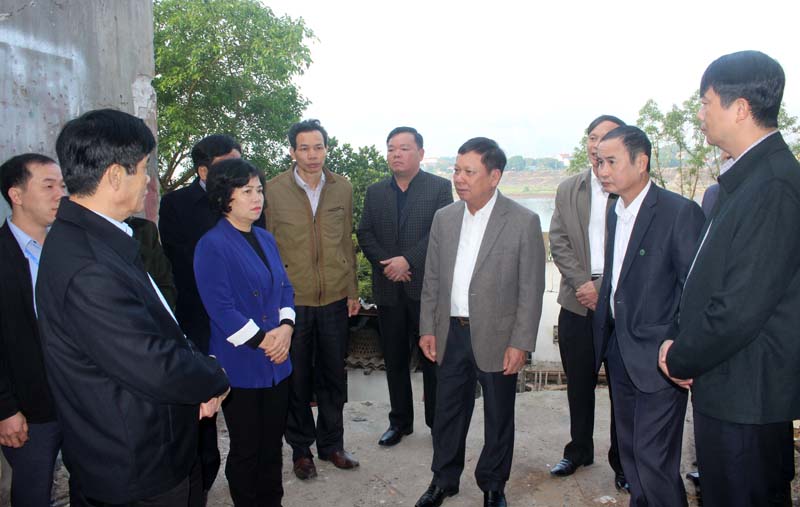
(HBO) – Bui Van Tinh, member of the Party Central Committee and Secretary of the Party Committee of Hoa Binh province, on December 18 met with households affected by landslides at residential area 26 in Dong Tien ward, Hoa Binh city. Nguyen Thi Oanh, head of the provincial Party Committee’s mass mobilisation board, and Nguyen Van Dung, Vice Chairman of the provincial People’s Committee, were present at the event.

Secretary of the
provincial Party Committee Bui Van Tinh and his entourage inspect a landslide
site at residential area 26 in Dong Tien ward, Hoa Binh city.
Due
to floods in 2017 and 2018 and water discharge of Hoa Binh Hydropower Plant, cracks
and landslides were found at residential area 26 in Dong Tien ward, Hoa Binh
city, at about 10a.m on July 30, 2017, which have greatly affected production
and daily life of local residents.
Given
this, the provincial People’s Committee sent forces and equipment to evacuate
people and assets to safer places. A total of 33 households have been moved to
Trung Minh commune’s resettlement area. Thirty two households have received
land for resettlement and 24 of them have begun housing construction.
Speaking
at the working session, Tinh expressed his sympathy over losses and
difficulties facing people at residential area 26 in Dong Tien ward. He asked
the provincial People’s Committee to reclaim land of households who have received
resettlement land and not allow any family to stay in areas vulnerable to
landslides. Households should be forced to move when necessary, he said.
Stressing
the need to promptly complete infrastructure to help locals soon stabilise
their lives, Tinh said each resident should get 15kg of rice within three
years.
Better
communication work will help improve public awareness of natural disaster
combat, he added, noting that sand and gravel gathering sites along the two
banks of the Da River must be dispersed.
Landslide
risks should be announced to avoid incidents in 2019 and the years to come at
residential areas 25 and 26 in Dong Tien ward, and mechanisms to support people
in residential areas in seeking jobs should be issued to help them stabilise their
lives in both short and long terms, he said.
The Standing Board of the Hoa Binh provincial Party Committee has agreed in principle on a proposal by the Standing Board of the Party Committee of Hoa Binh city to gather feedback on the city’s 1:2000 zoning plan, which forms part of its broader urban development strategy.
Hoa Binh province has made notable progress in public administration reform and digital government development, with the satisfaction index among citizens and businesses reaching over 84%, according to recent government evaluations.
Thanks to great efforts by local authorities in recent times, the governance and public administration performance of Mai Chau district has been significantly improved.
In the afternoon of June 6, the Party Committee, the People's Council, the People's Committee and the Fatherland Front of Lac Son district solemnly held a meeting to celebrate the 139th anniversary of the district's founding (1886–2025) and the 79th anniversary of the establishment of the district's Party Committee (1946–2025). There was the attendance of Mr. Bui Van Thang, the Vice Chairman of the Provincial People's Council; Mr. Quach Tat Liem, the Vice Chairman of the Provincial People's Committee; Ms. Dang Bich Ngoc, the Deputy Head of the National Assembly Delegation of the province; as well as the former leaders of the province and district through various periods, who are the natives of the district.
Implementing the Politburo’s Resolution No. 57-NQ/TW on breakthroughs in science – technology, innovation, and digital transformation is a golden opportunity for the northern mountainous province of Hoa Binh to renew growth model, improve competitive edge and shorten digital gap.
Resolution 57-NQ/TW, issued by the Politburo on December 22, 2024, identifies sci-tech, innovation, and digital transformation as strategic breakthroughs to build a developed and prosperous nation. In Hoa Binh province, this spirit is not just a slogan, it’s being put into action through concrete initiatives that form a "new development triangle”: digital citizenship, digital economy, and digital administration.



